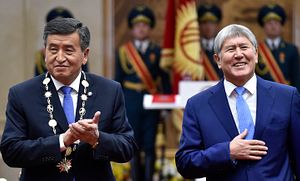Kyrgyzstan’s dominant political party is splitting. With parliamentary elections expected in October 2020, the shattering of the Social Democratic Party (SDPK) has implications for the balance of power in the state.
In the first of two competing party congresses this week, on April 3 the SDPK Without Atambayev movement gathered 300 delegates in Bishkek to break with former President Almazbek Atambayev.
Atambayev, who served as president from 2011 to 2017, was elected head of the party in late March 2018. One quirk of the Kyrgyz political system is that while presidential candidates tend to be put forth by political parties, elected presidents must withdraw from those parties for their term of office. Nevertheless, the political association remains in essence even if it is technically paused in the interest of serving the Kyrgyz people. This tension has become painfully clear as the rift between Atambayev and his successor, Sooronbay Jeenbekov, widened — even though both had been SDPK members.
Before leaving office, Atambayev suggested he would retire from politics but he changed his tune shortly after stepping down. A month after Jeenbekov was elected (with Atambayev’s firm support) in October 2017, Atambayev vowed to return to politics and lead the SDPK in the 2020 parliamentary polls.
The relationship between Atambayev and Jeenbekov soured early in 2018, the deterioration punctuated by the steady firing of Atambayev-era top officials and the fallout of the breakdown of the Bishkek power plant in January 2018. When Atambayev was elected to lead the SDPK, his remarks placed blame for the power plant’s failure and the government’s handling of the crisis — which came during a cold snap and after a multimillion dollar modernization project carried out with Chinese loans by Chinese partners — on Jeenbekov. At the same time, Atambayev urged Jeenbekov to push his brother, Asylbek, to leave parliament. Asylbek Jeenbekov, an elected SDPK parliamentarian, wasn’t even invited to the party’s March 2018 congress. (For more on the rift between Atambayev and Jeenbekov, read this piece from Bruce Pannier last week.)
Last month, the SDPK and the SDPK Without Atambayev movement announced separate party congresses. The SDPK, led by Atambayev, is expected to gather on April 6.
Promising renewal, the breakaway SDPK gathering elected Sagynbek Abdrakhmanov the leader of the party (he was apparently the only candidate). Abdrakhmanov, it’s important to note, had been expelled from the SDPK in the run-up to the 2017 election after criticizing Atambayev and has led the SDPK Without Atambayev movement from its inception. Abdrakhmanov said he was supported by Isa Omurkulov and Asylbek Jeenbekov, though Kyrgyz media, like Kloop.kg, note that neither has commented on the matter, and 24.kg reported that Omurkulov convened the congress but did not attend.
Omurkulov led the SDPK faction in parliament until November 2018, when he was expelled from the party.
On the same day the SDPK breakaway faction held its congress, Asylbek Jeenbekov announced his withdrawal from the SDPK. According to 24.kg, the younger Jeenbekov said he would remain a part of SDPK faction in parliament, but has withdrawn from the party.
On March 18, the day after Atambayev issued an apology for helping Jeenbekov win the presidency, the Atmabyev-led part of SDPK announced it would be joining the opposition. As RFE/RL reported in March, while the SDPK announced it would join the opposition, a party spokeswoman “did not indicate whether the SDPK would quit the ruling coalition.”
It’s unclear precisely how the balance of power will shake out, but it is clear that the SDPK is headed for a real split. Abdrakhmanov said his version of the SDPK would seek re-registration and claimed the April 3 congress was the “only legitimate one.”
We can expect Atambayev’s SDPK will similarly claim the party’s name on April 6 when it holds its congress — how this works out in reality is worth watching closely. In politics, there’s power in name recognition and the SDPK has been at the top of the political sphere for nearly a decade now. But the party is in chaos. That chaos creates both uncertainty and opportunity as parliamentary polls set for next year approach.
April 6 is the ninth anniversary of the start of the 2010 Kyrgyz revolution. On April 6, 2010 protests in Talas against the government of then-President Kurmanbek Bakiyev turned violent. Nine days later Bakiyev fled the country and resigned from office.

































